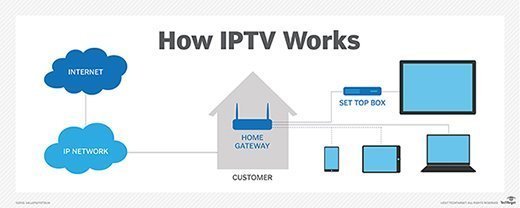In today’s fast-paced digital world, the way people consume television has drastically changed. Gone are the days when families would gather around a traditional TV set to catch their favorite programs at fixed times. With the rise of high-speed internet and innovative streaming technologies, Internet Protocol Television (IPTV) has become a game-changer, redefining how viewers watch live TV, movies, sports, and on-demand content.
But what exactly is IPTV, and how does it differ from traditional broadcasting methods such as cable or satellite TV? This article will provide a comprehensive explanation, exploring the fundamentals of IPTV, its advantages, its limitations, and why it has become the preferred choice for millions worldwide.
Understanding IPTV
At its core, IPTV (Internet Protocol Television) is a system where television content is delivered using the internet protocol (IP) rather than traditional satellite signals or cable. Instead of receiving channels through antennas or dish receivers, IPTV streams content via the internet, allowing viewers to watch programs on smart TVs, computers, smartphones, and even dedicated IPTV set-top boxes.
Unlike traditional broadcasting, IPTV gives users the freedom to choose when and how they watch their favorite shows. Whether it’s live sports, recorded TV programs, or on-demand movies, IPTV offers flexibility and customization that cable and satellite cannot match.
Traditional Broadcasting: Cable and Satellite TV
Before IPTV became popular, television broadcasting relied primarily on terrestrial, satellite, and cable networks.
- Cable TV uses coaxial or fiber-optic cables to transmit content directly to your home.
- Satellite TV transmits signals from satellites orbiting the earth, which are captured by a dish installed at the viewer’s location.
- Terrestrial TV broadcasts signals through antennas that pick up over-the-air transmissions.
While these methods were groundbreaking in their time, they come with limitations. Viewers are bound by the provider’s broadcasting schedule, face geographic restrictions, and often pay high subscription fees for bundled channels they may never watch.
Key Differences Between IPTV and Traditional TV
Here are the most significant differences between IPTV and traditional broadcasting:
- Delivery Method
- IPTV uses the internet to deliver content, while cable and satellite rely on physical infrastructure or satellites.
- IPTV uses the internet to deliver content, while cable and satellite rely on physical infrastructure or satellites.
- Content Flexibility
- Traditional TV follows a fixed schedule. IPTV provides video-on-demand (VoD), catch-up TV, and live streaming.
- Traditional TV follows a fixed schedule. IPTV provides video-on-demand (VoD), catch-up TV, and live streaming.
- Device Compatibility
- IPTV can be streamed on multiple devices such as smartphones, tablets, and smart TVs. Traditional TV requires a cable box or satellite dish.
- IPTV can be streamed on multiple devices such as smartphones, tablets, and smart TVs. Traditional TV requires a cable box or satellite dish.
- Interactivity
- IPTV often includes interactive features such as pausing live TV, rewinding, and choosing multiple camera angles during live sports. Traditional TV lacks this flexibility.
- IPTV often includes interactive features such as pausing live TV, rewinding, and choosing multiple camera angles during live sports. Traditional TV lacks this flexibility.
- Customization and Cost
- IPTV allows viewers to subscribe only to channels or packages they want, often at a lower cost. Cable TV usually forces bundled subscriptions.
- IPTV allows viewers to subscribe only to channels or packages they want, often at a lower cost. Cable TV usually forces bundled subscriptions.
Why IPTV is Gaining Popularity
The rise of IPTV is no coincidence. Several factors make it the go-to choice for modern entertainment:
- Convenience and Accessibility
- Viewers can access IPTV content anywhere with an internet connection, breaking the geographical barriers of cable and satellite TV.
- Viewers can access IPTV content anywhere with an internet connection, breaking the geographical barriers of cable and satellite TV.
- Rich Content Libraries
- IPTV providers often include thousands of channels, movies, and series from across the globe, appealing to diverse audiences.
- IPTV providers often include thousands of channels, movies, and series from across the globe, appealing to diverse audiences.
- Better Quality Streaming
- With advancements in internet speeds and 5G technology, IPTV supports HD, 4K, and even 8K streaming.
- With advancements in internet speeds and 5G technology, IPTV supports HD, 4K, and even 8K streaming.
- Cost-Effectiveness
- Many IPTV subscriptions cost significantly less than cable or satellite packages, making it budget-friendly.
- Many IPTV subscriptions cost significantly less than cable or satellite packages, making it budget-friendly.
The Role of Monster IPTV in the Modern IPTV Landscape
When it comes to choosing an IPTV provider, reliability and quality matter the most. This is where Monster IPTV stands out as one of the best options available today. With a wide range of international channels, premium sports coverage, and on-demand movies, it delivers a truly complete entertainment experience.
Unlike many providers that offer unstable servers and frequent downtime, Monster IPTV ensures high-quality, uninterrupted streaming, even during peak hours. This makes it ideal for sports enthusiasts, movie lovers, and families who want a dependable service.
Advantages of IPTV Over Traditional Broadcasting
- Time-Shifting Capabilities
- IPTV allows users to watch shows later (catch-up TV) or pause live events, something impossible with cable TV.
- IPTV allows users to watch shows later (catch-up TV) or pause live events, something impossible with cable TV.
- Global Access
- Viewers can watch international content that would otherwise be unavailable in their region.
- Viewers can watch international content that would otherwise be unavailable in their region.
- Personalization
- IPTV platforms often recommend content based on viewing habits, enhancing the overall experience.
- IPTV platforms often recommend content based on viewing habits, enhancing the overall experience.
- Interactive Features
- Features like multiple subtitles, audio options, and interactive program guides elevate IPTV beyond traditional TV.
- Features like multiple subtitles, audio options, and interactive program guides elevate IPTV beyond traditional TV.
Challenges of IPTV
While IPTV is rapidly becoming mainstream, it is not without challenges:
- Internet Dependency: A stable, high-speed internet connection is required. Poor connections result in buffering or lower quality.
- Legality Concerns: Not all IPTV providers operate within legal frameworks, which raises issues regarding piracy.
- Server Reliability: Some low-cost IPTV services struggle with stability and uptime.
This is why selecting a trustworthy provider such as Monster IPTV is crucial for an enjoyable and worry-free experience.
The Future of IPTV
The future of television is undoubtedly leaning towards IPTV and streaming platforms. With advancements in 5G, fiber optics, and cloud technology, IPTV will only get faster, more reliable, and more accessible worldwide. Interactive TV, virtual reality integration, and AI-based content recommendations will further revolutionize how people experience entertainment.
Conclusion
To sum up, IPTV represents the evolution of television in the internet era. Unlike traditional broadcasting methods such as cable or satellite, IPTV offers unmatched flexibility, affordability, and accessibility. For viewers who want an all-in-one entertainment solution, IPTV is not just an alternative—it is the future.
If you’re considering making the switch, exploring reliable services like IPTV Monster Teste is an excellent starting point. With its diverse content offerings and stable streaming, it’s no wonder that millions of users are moving away from traditional broadcasting and embracing IPTV as their main source of entertainment.



